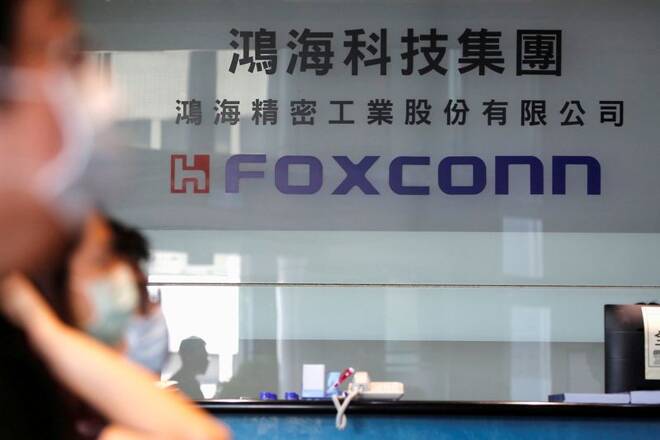Advertisement
Advertisement
Taiwan’s Foxconn says is shareholder of troubled Chinese chip firm
By:
TAIPEI (Reuters) - Taiwan's Foxconn, the world's largest contract electronics maker, would need Taiwanese government permission if its unit were to invest in embattled Chinese chip conglomerate Tsinghua Unigroup, a government official said on Thursday.
TAIPEI (Reuters) -Taiwan’s Foxconn, the world’s largest contract electronics maker, said on Thursday it was a shareholder in embattled Chinese chip conglomerate Tsinghua Unigroup via a 5.38 billion yuan ($798 million) investment by a subsidiary.
Foxconn, best known for assembling Apple Inc’s iPhone, is keen to make auto chips in particular as it expands into the electric vehicle market. The company has been seeking to acquire chip plants globally as a worldwide chip shortage rattles producers of goods from cars to electronics.
Foxconn said in a statement to the Taipei stock exchange that its China-listed unit Foxconn Industrial Internet Co Ltd controlled 99% of a Chinese entity called Xingwei, which controls a 48.9% stake in a different entity that itself holds a 20% stake in the vehicle that owns all of Unigroup.
Foxconn Industrial said in March it had invested 9.8 billion yuan in Xingwei.
Speaking earlier on Thursday, an official at Taiwan’s Economy Ministry, which has to approve large-scale investments in China, said they had been in contact with Foxconn and “reminded them that the case needs to be reviewed before doing anything”.
Foxconn said it had handled the case “in accordance with the rules”. It did not elaborate.
The island’s government has become increasingly cautious about China’s ambition to boost its semiconductor industry and has proposed new laws to prevent what it says is China stealing its chip technology, amid rising concern in Taipei that Beijing is stepping up its economic espionage.
Taipei prohibits companies from building their most advanced foundries in China to ensure they do not offshore their best technology.
Originating as a branch of China’s prestigious Tsinghua University, Tsinghua Unigroup emerged in the previous decade as a would-be domestic champion for China’s laggard chip industry.
But the company fell into debt under former chairman Zhao Weiguo, prompting it to default on a number of bond payments in late 2020 end eventually face bankruptcy.
The conglomerate has yet to produce any global leaders in the semiconductor sector.
($1 = 29.8480 Taiwan dollars)
($1 = 6.7405 Chinese yuan renminbi)
(Reporting by Jeanny Kao and Yimou Lee; Additional reporting by Josh Horwitz; Writing by Ben Blanchard; Editing by Muralikumar Anantharaman and Tomasz Janowski)
About the Author
Reuterscontributor
Reuters, the news and media division of Thomson Reuters, is the world’s largest international multimedia news provider reaching more than one billion people every day. Reuters provides trusted business, financial, national, and international news to professionals via Thomson Reuters desktops, the world's media organizations, and directly to consumers at Reuters.com and via Reuters TV. Learn more about Thomson Reuters products:
Did you find this article useful?
Latest news and analysis
Advertisement
